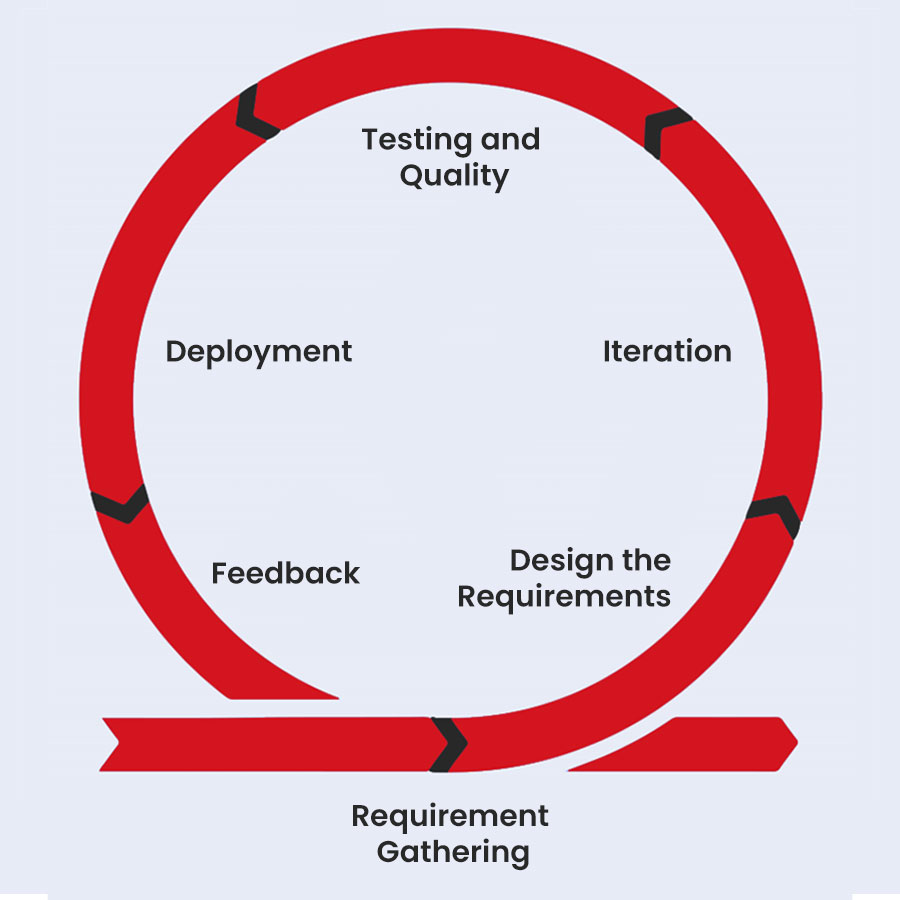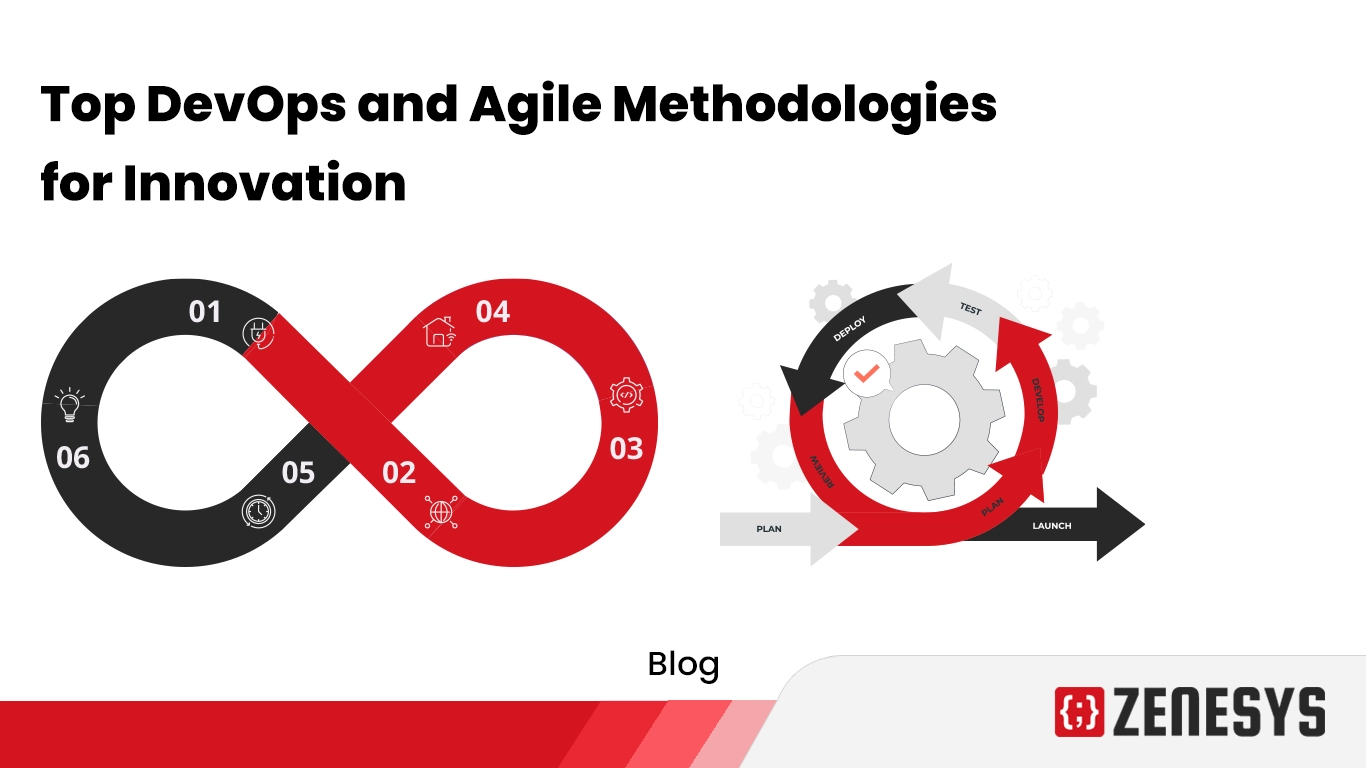The developing industry has witnessed massive changes due to evolving digital landscape, and staying ahead of the competition is essential. But to conclude so, it requires not only a great product or service but also the ability to innovate and adapt quickly.
This is where DevOps and Agile methodologies make differences, revolutionizing the way organizations develop and deliver software solutions.These approaches have become indispensable tools for driving innovation in the software development industry by stimulating collaboration, efficiency, and continuous improvement.
This blog post will explore these top methodologies that empower your teams to embrace change, break down silos, and create a culture of continuous novelty and innovation. From accelerating time-to-market to improving product quality, these methodologies have proven to be game-changers for organizations resulting in their growth.
Prepare yourself as we go into the worlds of DevOps and Agile, learning about their fundamental tenets and discovering the relationship between Agile and DevOps and how they work in unison to foster creativity. We will also look at actual instances of successful implementations, illustrating the advantages and difficulties of each methodology.
This blog will offer helpful insights and viable tactics for utilizing DevOps and Agile to foster a culture of innovation, whether you are a budding developer, an experienced IT professional, or a corporate leader trying to maintain one.
Let's discover the power of DevOps and Agile methodologies and unlock new possibilities for your organization. So, fasten your seatbelts, prepare for an exciting journey together, and pave the way for innovation in the digital age!
How about starting the train of information by building strong basics?
What is Agile Methodology?
Agile methodology is an iterative and flexible approach to project management. This methodology is primarily used in software development. It focuses on collaboration, adaptability, and continuous improvement. In agile, projects are divided into small increments called sprints. These sprints typically last 1-4 weeks, during which cross-functional teams work on specific tasks.
The agile methodology also promotes frequent communication and feedback, allowing teams to respond quickly to changes and deliver working software within no time. The key principles of agile are:
• Prioritizing customer satisfaction
• Embracing change
• Empowering self-organizing teams
• Promoting continuous delivery
Agile and agile testing methodology sustains transparency, efficiency, and early value delivery by emphasizing iterative development, regular inspections, and adaptations throughout the project lifecycle.
How Does the Agile Model Works for Unified Software Development?
.png)
What is DevOps Methodology?
The developing industry has witnessed massive changes due to evolving digital landscape, and staying ahead of the competition is essential. But to conclude so, it requires not only a great product or service but also the ability to innovate and adapt quickly. This is where DevOps and Agile methodologies make differences, revolutionizing the way organizations develop and deliver software solutions. These approaches have become indispensable tools for driving innovation in the software development industry by stimulating collaboration, efficiency, and continuous improvement.
DevOps is a methodology that deals with collaboration, communication, and integration between software development (Dev) and IT operations (Ops) teams. It primarily aims to optimize the software development lifecycle by promoting continuous integration, delivery, and deployment. DevOps helps with automation, infrastructure as code, and the use of tools for version control, testing, and monitoring.
DevOps enables faster development cycles, quicker time-to-market, improved quality, and increased operational efficiency by breaking down silos and fostering a culture of collaboration. The DevOps agile process focuses on delivering value to customers through rapid and reliable software releases while maintaining stability, scalability, and resilience in production environments.
How does DevOps Work for Unified Software Development?
Here is the narration of how DevOps and agile methodology in DevOps work to give you flawless software development:
1. Requirements Gathering
-
• Recognize and document the goals, objectives, and requirements of the projects.
-
• Run discussions with the clients and understand the needs of the business.
-
• Create a detailed specification document.
2. Planning
-
• Explain the project scope, timeline and resource requirements
-
• Divide the work into smaller tasks and prioritize them according to the milestone decided.
-
• Appoint the resources and define team roles and responsibilities.
3. Design
-
• Develop and design good architecture.
-
• Fix the system component, modules, and their interactions.
-
• Provide a user interface and experience (UI/UX)
-
• Complete the documentation and prototyping
4. Development
-
• Write code based according to the design
-
• Conclude the best practices of coding standards
-
• Implement unit testing so that you can ensure code quality and functionality is top-Notch
-
• Regular integration of code changes into a shared repository.
5. Testing
-
• Conduct the vivid tests that can help your quality assurance
-
• Identify the bugs found in testing and rectify them
-
• Conduct performance and security testing
-
• Ensure that you succeed in meeting all the objectives of your clients.
6. Deployment
-
• Get it ready for production release
-
• Set up the necessary infrastructure and environment apt for the release
-
• Deploy the software to the production environment
-
• Troubleshoot the issues that you encounter during deployment
7. Maintenance and Support
-
• Provide them support and maintenance whenever needed
-
• Address their problem and fix the bugs that are creating issues.
8. Continuous Improvement
-
• Ask and analyze the feedback from your clients
-
• Check the areas of improvement in the process
-
• Continuous update and refining.
Agile Methodology Vs. DevOps Methodology: The War of Superiority
Agile and DevOps methodologies aim to improve software development efficiency, quality, and speed. Although, they differ in their focus and principles, leading to a popular "war of superiority" between the two.
In this article, we will delve into the specialties of Agile and DevOps, highlighting their strengths and discussing how they can complement each other for seamless software development.
Though the relationship between agile and DevOps is on and off. Sometimes they both complement each other and there are cases that contradict situations. Let's understand in brief:
Agile Methodology: Speed and Flexibility
Agile is known and used for its iterative and incremental approach, emphasizing the quick delivery of the software. It promotes adaptability, collaboration, and customer involvement throughout the development process. Points to be known:
-
• Agile principles and the importance of the Agile Manifesto.
-
• Iterative development cycles and frequent customer feedback.
-
• Emphasis on self-organizing teams and continuous improvement.
-
• Agile methodologies like Scrum, Kanban, and Extreme Programming (XP).
DevOps Philosophy: Integration and Collaboration
On the other hand, DevOps focuses on the unified integration of development and operations teams. It also focuses on automation, continuous integration/delivery (CI/CD), and shared responsibility for the complete software development lifecycle. Key points to discuss:
-
• DevOps principles and the aim of breaking down silos between development and operations.
-
• Automation and infrastructure as code (IaC) for faster and more reliable deployments.
-
• Continuous integration and continuous delivery pipelines for rapid releases.
-
• Collaboration, communication, and feedback loops in the DevOps culture.
Agile And DevOps Synergy
While Agile and DevOps methodologies are two different approaches, they can work synergistically to achieve superior and desired results. Discuss how their integration can lead to seamless software development:
-
• The Agile and DevOps connection in terms of shared principles and values.
-
• Agile methodologies provide the foundation for DevOps practices.
-
• Continuous integration and delivery align with Agile's iterative and incremental development.
-
• How Agile focuses on customer feedback complements DevOps' emphasis on automation and fast deployments.
Challenges and Pitfalls
Highlight the challenges and potential pitfalls of each approach, acknowledging that no methodology is without its drawbacks:
-
• The potential of Agile for scope creep and difficulty scaling for large projects.
-
• DevOps' complexity and the need for organizational buy-in and cultural change.
-
• Potential conflicts arise from differing priorities, such as Agile's focus on customer requirements versus DevOps' focus on system stability.
The Ideal Combination
-
• Rather than pitting Agile against DevOps, emphasize the benefits of combining the two:
-
• The importance of fostering a culture of collaboration and continuous improvement.
-
• How Agile and DevOps can reinforce each other's strengths and mitigate weaknesses.
-
• Real-life success stories showcasing the power of Agile and DevOps integration.
How can Zenesys help?
Zenesys, a leading software development company, understands the significance of Agile and DevOps methodologies in driving success for your business. With more than a decade of experience and expertise in these approaches, Zenesys can revolutionize your industry by delivering high-quality and tailored software solutions with faster time-to-market.
By leveraging agile methodology in DevOps and Agile principles, Zenesys ensures flexibility, continuous customer collaboration, and iterative development that suits your industry issues and requirements. Additionally, their proficiency in DevOps enables effortless and smooth integration, automation, and continuous delivery, streamlining your software development lifecycle. With Zenesys as your partner, you can harness the power of Agile and DevOps to stay ahead of the competition, drive innovation, and achieve business growth.
Conclusion
Innovation is the heartbeat of progress, so in the ever-evolving landscape of software development, Integrating Agile and DevOps can act as the catalysts for transformative innovation. Organizations are unlocking a world of endless possibilities where collaboration, automation, and continuous improvement reign supreme with the help of these two methodologies.
Talking about the exhilarating realm of software development, DevOps and Agile methodologies stand as the vanguards of innovation. Through their harmonious partnership, organizations embrace the winds of change, pushing the boundaries of all the impossibilities. They can help you conquer everything with their iterative approach, customer-centricity, integration and rapid development.
Frequently Asked Questions (FAQs)
Q1. What is Agile methodology, and how can it benefit my organization?
Agile methodology is an iterative approach to software development that focuses on flexibility, collaboration, and delivering incremental value to customers. It enables faster time-to-market, improved adaptability to changing requirements, and increased customer satisfaction through regular feedback loops.
Q2. What is DevOps, and why is it crucial for modern software development?
DevOps is a cultural and technical approach that promotes collaboration and integration between development and operations teams. It aims to streamline the software development lifecycle, enhance automation, and achieve faster, more reliable deployments. DevOps enables organizations to improve efficiency, reduce time-to-market, and maintain stable and scalable software systems.
Q3. How can Agile and DevOps methodologies work together?
DevOps and Agile integration are highly complementary. Agile focuses on iterative development, customer collaboration, and flexibility, while DevOps emphasizes continuous integration, automation, and rapid deployments. By integrating Agile and DevOps, organizations can achieve seamless end-to-end software delivery, with Agile driving iterative development and DevOps ensuring efficient deployment and operations.
Q4. How can adopting Agile and DevOps methodologies impact our organization's bottom line?
Adopting Agile and DevOps methodologies can have a significant positive impact on an organization's bottom line. By enabling faster time-to-market, reduced development cycles, and improved customer satisfaction, these methodologies can drive revenue growth, increase customer retention, and enhance overall operational efficiency.
Q5. How does your company support the implementation of Agile and DevOps methodologies?
Our company specializes in helping organizations adopt and implement Agile and DevOps methodologies. We provide comprehensive services, including Agile coaching, training, and consulting, to guide organizations through their Agile transformation journey. We also offer expertise in DevOps tooling, automation, and process optimization, ensuring a smooth transition and successful implementation of DevOps practices within your organization.


.webp?lang=en-US&ext=.webp)

.webp?lang=en-US&ext=.webp)

